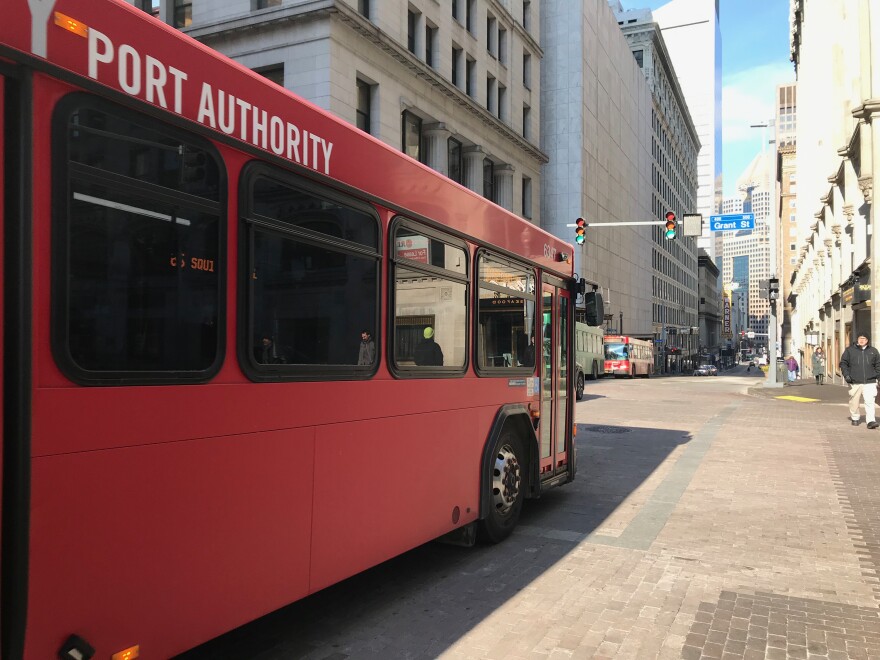Transit agencies across the state are facing budget shortfalls because of pending litigation against a state agency. Each year, the Pennsylvania Turnpike Commission sends $450 million to the Pennsylvania Department of Transportation to support mass transit, but two groups have alleged that the set-up is illegal.
Last March, a truckers’ association and a drivers’ advocacy organization filed suit in federal court and argued money generated by the turnpike can’t fund public transit, and non-turnpike investments more broadly.
With the lawsuit still in process, the Pennsylvania Turnpike Commission couldn’t secure the bond it uses to make the annual payment to PennDOT. Commission officials signed an agreement to hold off on the quarterly disbursements, but if the commission wins the lawsuit, PennDOT will be “made whole,” said Mark Compton, turnpike CEO.
Compton is confident the court will rule in their favor, but said the current funding crunch is a reminder that the commission’s payments to PennDOT drop significantly, to $50 million, in 2022.
“This is important foreshadowing of what’s to come for the state of mass transit in the very near future,” he said.
Pennsylvania’s transit agencies rely on state money for capital projects, with most of the funding sent to Philadelphia and Pittsburgh. Both SEPTA and Port Authority of Allegheny County whittled their capital budgets this year, and have been told to prepare for further cuts.
Port Authority pushed 44 projects out of its 2018-2019 fiscal year plans. While important, they didn’t rise to the level of top priority, said spokesperson Adam Brandolph.
“All the items we deem to be critical we are getting to,” he said. “No service is being cut as part of this funding shortfall.”
Similarly, SEPTA paused 37 projects, said spokesperson Andrew Busch. He added capital constraints could severely limit the future of the system.
“These are kind of state of good repair projects, things that we’re doing around the system to rebuild infrastructure, replace old vehicles,” he said.
In the meantime, PennDOT dipped into its reserves to get as much money to transit agencies as they could while the turnpike isn’t in a position to make payments, said spokesperson Erin Waters-Trasatt.
“We’re at this point now where, OK, it’s been going on for some time and we don’t know when or if [the lawsuit] will be resolved and what the result will be,” she said. “We have x amount of dollars and we need to decide how we’re going to use that x amount of dollars.”
If the lawsuit drags on into the next fiscal year, after July 1, Waters-Trasatt said capital payments to transit agencies will be “dramatically lower.” Beyond regional transit, Amtrak service could take a hit: half of PennDOT’s funding for Amtrak comes from the turnpike commission payment. In addition, it could imperil funding for large capital investments such as Pittsburgh's bus rapid transit plan.
Port Authority's Brandolph said it's too soon to have that conversation.
Public transit didn’t have a consistent funding stream until 2013, when Act 89 modified Act 44, which created the $450 million annual payment to PennDOT in 2007. Act 89 directed PennDOT to send that money to support public transit and multimodal projects across the state, a mechanism now called into question by the motorists’ lawsuit. Officials say even if the turnpike wins the lawsuit, state legislators must address the larger funding concerns.
Act 44 funding also supports initiatives in Allegheny County. Public works director Stephen Shanley wrote in a statement that the funding shortfall will not affect projects this year, but they could see some impact next year.
"That being said, we utilize a variety of funding sources to address our needs and will do everything we [can to] continue to ensure the safety of our roads and bridges regardless of what transpires with state-level funding," Shanley wrote.
Come 2022, the state will have to find $400 million in the general fund to support mass transit. Revenue created by the state vehicle sales tax is expected to cover the cost, but Compton said car sales aren’t rising as quickly as projected.
Turnpike tolls have increased each year since 2008.












